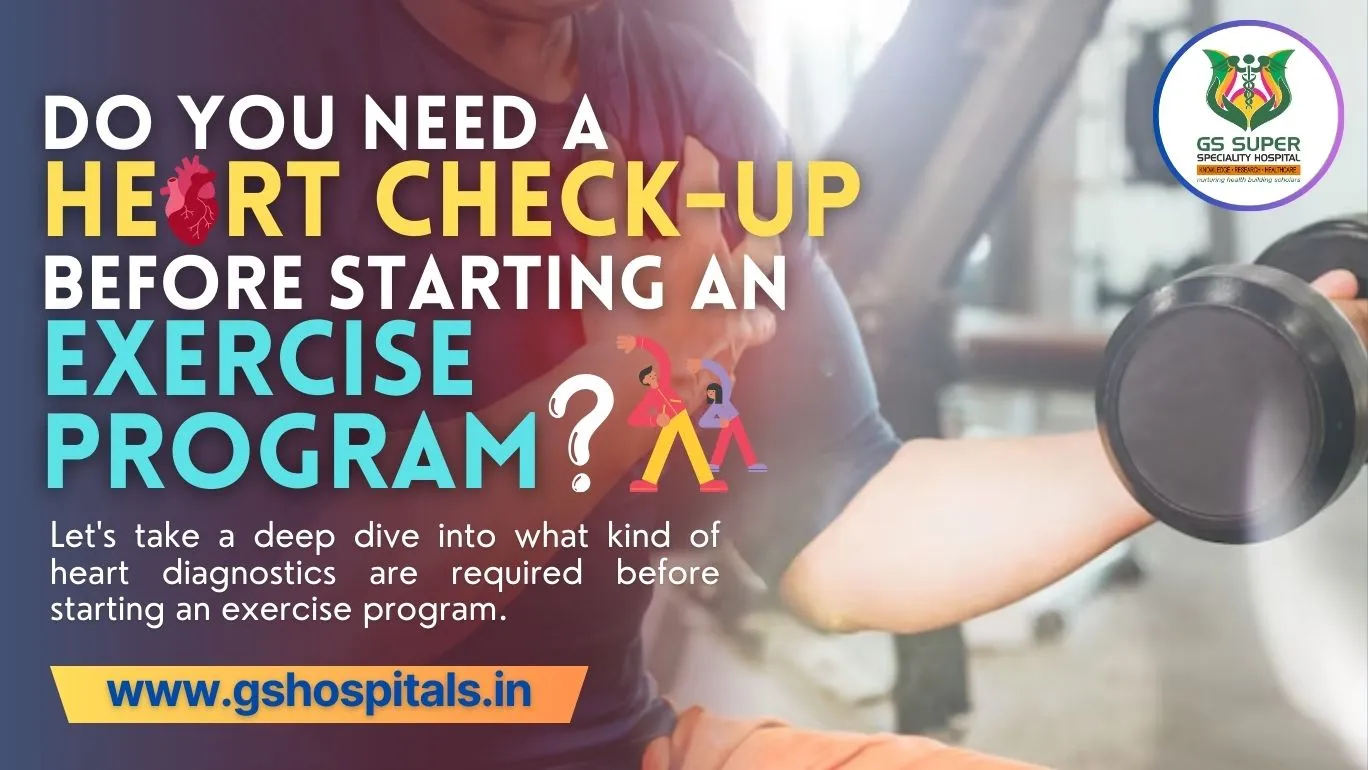Planning to start up with an exercise program? Well, here is what you need to do it. A heart check-up is a must before an exercise program. There is a specific reason behind this. In this blog, we shall explore why you need a heart check-up before starting an exercise program. Let's take a deep dive into what kind of heart diagnostics are required before starting an exercise program.
In the quest to get physically fit, the majority of people are turning to the gym. Let's not forget that many youngsters are falling prey to heart issues due to strenuous exercise. In this context, GS Hospital Hapur, a top heart care hospital in Ghaziabad, focuses on bringing about awareness of heart health among youngsters to take an initiative and check their heart health before starting an exercise program.

As a part of the check-up, here are the warning signs of heart disease which are also considered risk factors. Here are some important warning signals of heart issues that one must know.
As per research and American Heart Association (AHA) guidelines, it has been observed that heart health screening tests should be done as early as 20 years of age in people who have a strong family history of cardiac issues or higher health risks of developing cardiac issues.
Let us go ahead and read more about the steps to monitor your heart health in the next part of the article.
Routine heart health screenings are very important as a part of preventive health check-ups for everyone. Getting a heart health screening done at early stages of life can help prevent any heart issues. An advanced test along with a routine screening test may be required as recommended by your doctor. A detailed consultation with your doctor can help in evaluating the problem of cardiac issues.
As per AHA (American Heart Association) guidelines, it is recommended to do the following routine cardiac screening tests as follows:
If you are at high risk of cardiac problems, your doctor may recommend advanced cardiac tests which are as follows:
ECG test is also known as electrocardiography which involves placement of small sticky electrodes on the chest connected to the ECG machine. This machine helps in recording the electrical activity of the heart and provides accurate information about heart rate and rhythm.
The stress test is a very important test to check your stamina levels. Electrodes are applied to your chest and attached to an ECG machine. Then you are asked to walk or run on a treadmill, or pedal on a stationary bike to assess your heart’s response to physical stress.
A professional uses an ultrasound machine to check for the heart's rhythmic activity and to assess the heart functioning of the heart valves. This is mainly to check overall heart pumping activity or stress-related issues.
A small tube or catheter is inserted into the arm or groin area and threaded through an artery to your heart. A contrast dye is injected through the catheter allowing you to take X-ray pictures of the heart to check for narrowed or blocked arteries.
In this test, you are positioned under a CT scanner with electrodes attached to your chest to record your heart’s electrical activity. This scanner helps to create images to check up for plaque build-up in your coronary arteries.
A nuclear stress test uses an imaging machine to take pictures while at rest and after exercise to know the blood flow from the arteries to the heart.
This test helps provide insight into the heart’s activity to create pictures of your heart based on CT scan images. A contrast dye is injected into the bloodstream to make it easier to check for plaque buildup in the coronary arteries.
Your doctor may ask a screening question before complicated heart check-ups. Here is the list of screening questions before heart check-up which you must know.
In case of any irregular parameters, the doctor will assess your heart’s activity or functioning through a Holter monitor. A Holter monitor is a small battery-operated device that works as a compact portable ECG machine to record the heart’s functioning for 24-48 hours to rule out any irregular parameters.
Here are some of the guidelines for when you should get a heart check-up. The American Heart Association (AHA) recommends the following schedule for heart health screenings.
It has been confirmed that weight, BMI, blood pressure test, blood cholesterol test, and blood glucose are ideal parameters to check for any kind of heart issues.
It is important to monitor heart health at home by taking into consideration the following test.
To help lower the risk of heart disease, it is important to practice a healthy lifestyle. Here is a quick sneak peek into tips for maintaining a healthy heart.